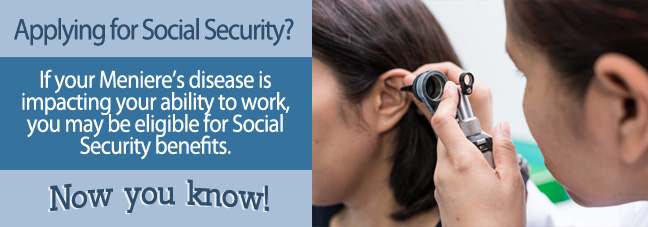The Social Security Administration (SSA) defines a functional limitation as a restriction or impairment of an individual’s ability to function in a manner that allows restricts them from taking part in a normal range of activities. Also, functional limitations relate to a person’s ability to work as well as handling routine activities of daily living.
The symptoms of Meniere’s disease can include a spinning sensation (vertigo), loss of hearing, ringing in the ears and problems with ear pressure. In addition imbalance, motion sickness, nausea, or rapid involuntary eye movement may occur as well. This can make it difficult to do jobs like driving or working in the construction industry which require high degrees of concentration and responding quickly when required.
Qualifying For Disability Benefits with a Functional Limitation
Because of the vertigo associated with Meniere’s disease, it can be dangerous for anyone suffering from it to go to work. The SSA lists Meniere’s disease in their Blue Book, which means it is serious enough for the victim to qualify for social security disability benefits.
For anyone who fails to meet the Blue Book listings, the SSA has created a medical vocational allowance. This is specific to you and your job and the SSA will evaluate your functional limitations and skills with Meniere’s disease to see if you can take part in alternative employment or you can learn new skills if you are still young enough. If the SSA decides that you can’t do any type of job with Meniere’s disease because you don’t meet the criteria in the Blue Book, you can still be approved for SSD benefits under a medical vocational allowance.

What to Expect When Applying For SSD with a Medical Vocational Allowance
If you apply for a medical vocational allowance the SSA will ask you to undertake a residual functional capacity test (RFC). An RFC tests your ability to lift a heavy object, stand in one place without taking a rest and how much you can stretch and bend your torso.
The SSA will also review your medical history and decide how long the Meniere’s disease is likely to last. It will also assess your capabilities to do any other jobs relevant to your skills.
Next Steps to Take
To help to build your case for disability benefits or a medical vocational allowance you will need to provide as much evidence as you can which proves your disability from Meniere’s disease disallows you from working. This includes your work history, your RFC test results provided by your physician and your present and past medical records. The SSA will then decide whether your disability is severe enough to qualify for disability benefits or a medical vocational allowance.
Talk to a Disability Attorney
Qualifying for social security disability benefits is not an easy process but talking to a disability attorney may help increase your chances of success. Fill out the Free Case Evaluation on this page today!